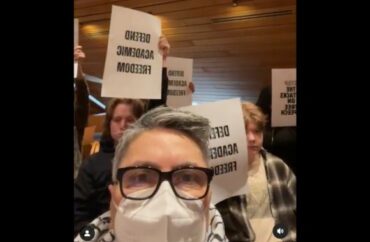
Protesters condemn proposal as ‘attempt to control’ university messaging
Student activists disrupted a recent University of Minnesota Board of Regents meeting to protest a new institutional neutrality proposal, arguing it violates free speech.
“The Board introduced a resolution on institutional speech stating the president is the primary spokesperson for the University, and statements addressing matters of public concern or interest are no longer permitted,” The Minnesota Daily reported.
The policy would mandate that members of the university clarify they are expressing their own personal views and not representing the school’s position when addressing matters of public concern.
At the end of Friday’s meeting, Students for a Democratic Society chanted and held signs stating “stop the attacks on free speech.”
View this post on Instagram
The group also explained its position in a video posted to Instagram following the meeting.
“Earlier this morning, the Board of Regents reviewed a resolution that would make it mandatory to get presidential approval for department statements within the universities and prohibit statements related to ‘public concern’ or ‘public interest,’” a member of the group said in the video.
View this post on Instagram
She called the proposal a clear “attempt to control messaging coming out of the university.”
“It should not have to be said that no university president has the expertise to decide what statements should or should not be released,” she said.
One of the regents, Robyn Gulley, also opposed the proposal. During the meeting, she said it was “too vague” and failed to “differentiate between units, departments and centers while trying to address a specific issue,” The Minnesota Daily reported.
“We could use a scalpel, but we use a bulldozer,” she said.
Meanwhile, Regent Douglas Huebsch expressed support for institutional neutrality, saying it is necessary because the university is not a political entity.
The regents will vote on the policy at a “later meeting,” The Minnesota Daily reported.
Several other universities have recently adopted similar proposals. Yale University, for example, announced in October that school officials will “refrain from issuing statements concerning matters of public, social, or political significance, except in rare cases,” The College Fix previously reported.
Dartmouth College recently also joined several Ivy League universities in adding a institutional neutrality policy.
Last year, the University of Southern California, Purdue University, Johns Hopkins University, and the University of Texas System made similar announcements.
MORE: Institutional neutrality doesn’t go far enough, professor argues
IMAGE: umnsds/Instagram
Like The College Fix on Facebook / Follow us on Twitter






Please join the conversation about our stories on Facebook, Twitter, Instagram, Reddit, MeWe, Rumble, Gab, Minds and Gettr.